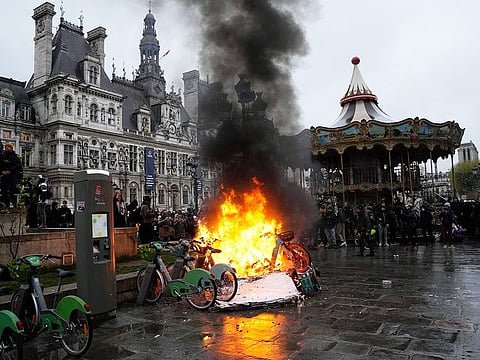Macron cleared to raise French retirement age to 64, protesters vow to fight on
Macron, government now hope to move on as the move gets constitutional green light

Paris: French President Emmanuel Macron's flagship pension reform will enter into force swiftly, officials said on Friday after it received the Constitutional Council's approval despite months of street protests and strikes.
The legislation, which pushes up the age at which one can draw a pension to 64 from 62, remains deeply unpopular, and spontaneous protests broke out when the Constitutional Council's decision was announced.
Protesters gathered outside Paris City Hall holding banners reading "climate of anger" and "no end to the strikes until the reform is withdrawn", in a sign the Council's verdict was unlikely to end widespread anger with Macron and his reform.
Some burnt trash bins as they marched through Paris, singing a chant popular with anti-Macron protesters: "We are here, we are here, even if Macron does not want it, we are here." Opinion polls show a vast majority reject the policy changes, as well as the fact that the government pushed the bill through parliament without a final vote it might have lost.
"All the labour unions are calling on the President of the Republic to show some wisdom, listen and understand what is happening in the country and not to promulgate this law," the leader of the CGT union Sophie Binet said.
In a joint statement, unions said this was "the only way to soothe the anger in the country." But officials shrugged off the request, saying the text would be turned into law in the coming days. Labour Minister Olivier Dussopt said it should enter into force on Sept. 1 as initially planned.
'The fight continues'
The Constitutional Council said the government's actions were in line with the constitution and approved raising the legal retirement age, with only peripheral measures meant to boost employment for older workers struck down on the grounds that they did not belong in this legislation.
"The country must continue to move forward, work, and face the challenges that await us," Macron said earlier this week, looking to move on to other reforms.
But the opposition said they would not back down and unions said they would not attend a meeting Macron wanted to organise with them on Tuesday.
"We won't give up. There will be a great May 1st," said teacher Gilles Sornay, 65, at the Paris rally, referring to protests planned for international workers' day.
"The fight continues," hard-left leader Jean-Luc Melenchon declared.
Separately, the Constitutional Council rejected a proposal by the opposition to organise a citizens' referendum on the pension reform.
The opposition has tabled another bid for a referendum, which is expected to be reviewed by the Council in early May.
Political observers say the widespread discontent over the government's reform could have longer-term repercussions, including a possible boost for the far right.
Far-right leader Marine Le Pen wrote on Twitter that "the political fate of the pension reform is not sealed," urging voters to back those who oppose it in the next election so that they can scrap it.
Macron says the French must work longer or else the pension budget will fall billions of euros into the red each year by the end of the decade.
But the pension system is a cornerstone of France's cherished social protection model and trade unions say the money can be found elsewhere, including by taxing the rich more heavily.
While attention has focused on the retirement age of 62, only 36% of French workers retire at that age and another 36% already retire older on account of requirements to pay into the system for at least 42 years in order to be able to claim a full pension.
That means the normal retirement age for a French worker who started working at the age of 22 was 64.5, marginally above a European Union average of 64.3, according to OECD figures based on 2020 data.
Sign up for the Daily Briefing
Get the latest news and updates straight to your inbox



